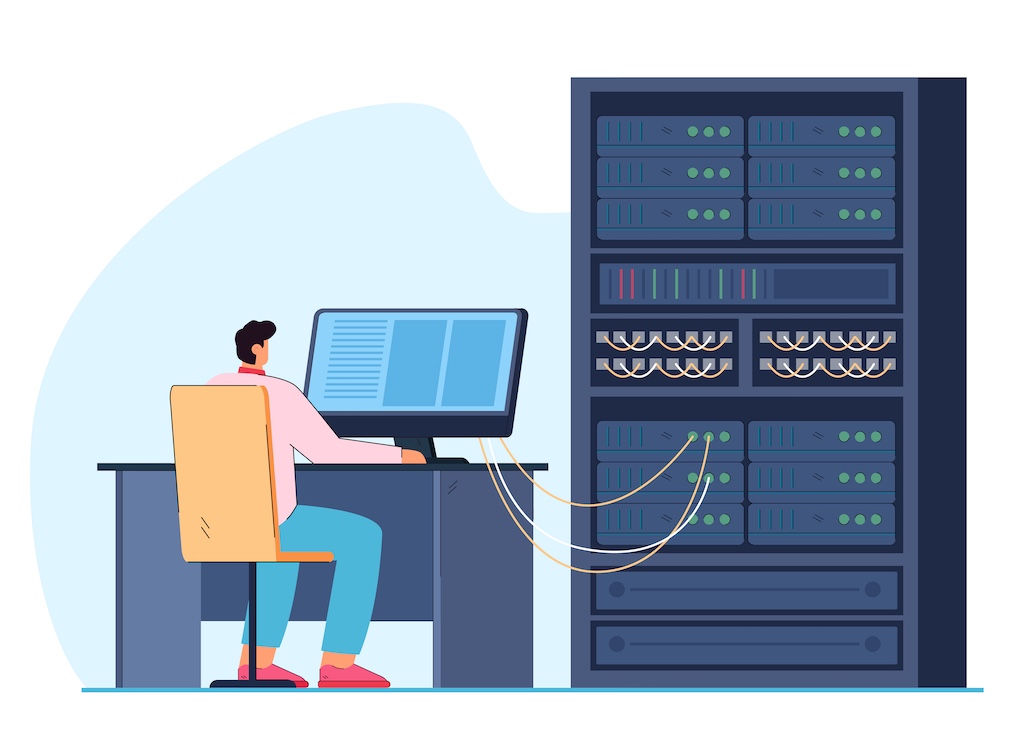When I built my first website, I was just excited to see my idea come to life on the internet. It felt like magic: typing a few things on my laptop and watching it turn into something others could see. But very quickly, I realised something important: getting a website online isn’t just about writing content or choosing colours. It’s also about choosing the right home for that website.
At first, I thought all web hosting companies were pretty much the same. I mean, how different could they be? They all promised fast speeds, great support, and ‘unlimited’ everything. But the more I worked on websites, for myself and for others, the more I learned that choosing the right hosting company can make a huge difference.
So, what actually makes a hosting solution stand out in a market filled with so many options? Let me walk you through what I’ve learned, through mistakes, small victories, and lots of trial and error.
- 1. Uptime You Can Rely On
- 2. Fast Loading Speeds (Because No One Likes to Wait)
- 3. Support That Feels Human
- 4. Security That Doesn’t Keep You Awake at Night
- 5. A Clear and Honest Price Tag
- 6. Ethical Values and Specialised Hosting Make a Difference
- 7. Hosting That Grows With You
- 8. A Dashboard That Doesn’t Confuse You
- 9. Real People, Real Community
- 10. A Name You Can Trust (Because Reputation Matters)
- 11. Location Can Actually Matter
- 12. Not Every Host Handles Email Well … And That Matters
- 13. You Shouldn’t Feel Trapped
- Final Thoughts: What Really Matters

1. Uptime You Can Rely On
This might sound technical, but it’s really simple. Uptime means how often your website is up and running. And honestly, if a hosting provider can’t keep your website online, nothing else really matters.
When I used one of the cheaper hosting companies in my early days, I’d get emails from friends saying, ‘Hey, your site’s down again.’ At first, I brushed it off. But when it started happening more often, especially during busy times, I knew it was a problem. People weren’t visiting my site because it just wasn’t available.
That’s when I learned to start looking for hosts that take uptime seriously. A great host should give you 99.9% uptime or better. And it shouldn’t just be something they advertise. They need to prove it with reliable service and real tools that track it.
2. Fast Loading Speeds (Because No One Likes to Wait)
Think about the last time you visited a slow website. Did you wait around for it to load? Or did you click the back button and move on? I know what I usually do: I leave.
Speed matters more than we think. It’s not just about being impatient. A slow website can affect everything from your Google ranking to how many people buy your products or read your blog.
What surprised me was that website speed doesn’t just depend on how many images or videos you upload. Your host plays a big role too. The server your website lives on has to be powerful enough to handle visitors and deliver content quickly. Once I switched to a better host that used SSD storage and proper caching, my website’s speed improved overnight.
3. Support That Feels Human
This one is personal to me. I remember a time when my website crashed right before an important event I was running. I was panicking. I reached out to my hosting company’s support team, hoping for help. Instead, I got a bunch of automated replies and links to FAQ pages. It felt like shouting into a void.
That experience taught me that real, friendly, and helpful support can make or break a hosting service. The best hosts have support teams that speak in plain language, not just tech jargon. They answer your questions patiently and treat you like a person, not a number.
Now, whenever I try a new hosting company, one of the first things I do is test their support. If they can’t help when things go wrong, it’s not the right fit, no matter how shiny their homepage looks.
4. Security That Doesn’t Keep You Awake at Night
Security is one of those things that most people don’t think about until it’s too late. I didn’t either. Then one day, I logged into my website and saw it had been hacked. My home page had been replaced with something … let’s just say it wasn’t family friendly.
It was terrifying. Not just because I didn’t know how to fix it, but because I realised my visitors could be affected too. They might click on a bad link or download something harmful.
That experience changed how I looked at web hosting. A great host should offer strong security features right from the start: things like automatic backups, malware scanning, SSL certificates, and firewalls. And more importantly, they should help you recover if something goes wrong.
Security isn’t just a fancy extra. It’s peace of mind.
5. A Clear and Honest Price Tag
Let me tell you: I’ve fallen for the ‘£2.99/month’ trick more than once.
What hosting companies sometimes do is show you a super low price on their homepage, but when it’s time to pay, that price only applies if you sign up for three years in advance, with no refunds. Or they charge extra for things like backups, SSL certificates, or even email addresses. These hidden costs add up, and it can feel like you’ve been tricked.
The best hosting companies are upfront about their pricing. They tell you exactly what’s included, what costs extra, and what you’ll be paying next year, not just today. Now I always read the small print before signing up, and I appreciate hosts that are honest and simple with their fees.
6. Ethical Values and Specialised Hosting Make a Difference
To be honest, I didn’t use to think about the values behind a hosting company. I just wanted something cheap and fast. But over time, my thinking changed. I started noticing how some companies treat their customers like numbers, while others genuinely seem to care about doing the right thing. That’s when I began paying attention to things like environmental responsibility and ethical business practices. It might sound unrelated to web hosting, but it’s not.
The internet runs on massive data centres that use a lot of electricity, and not all companies are doing their part to reduce the impact. If you’re looking for a provider that leans in that direction, Krystal UK hosting is one example: they use renewable energy and are open about how they operate. What stood out to me in general, though, was how much better it feels working with a company whose values align with yours.
The hosting itself might be fine either way, but when the people behind it seem thoughtful and fair, it makes a difference. For me, it’s not just about servers anymore, but more about choosing to support the kind of internet I’d rather be part of.
7. Hosting That Grows With You
When I built my first blog, I didn’t need much: just a simple place to write and share stories. But later on, I started adding more features, more pages, and eventually even an online shop. Suddenly, I needed more space, more speed, and more control. What I’ve learned is that a good hosting solution doesn’t just work for you today. It grows with you.
Look for a host that offers different plans. Maybe shared hosting at first, then options for VPS, cloud hosting, or dedicated servers later on. That way, you don’t have to move everything to a new company when your website gets bigger.
8. A Dashboard That Doesn’t Confuse You
Managing a website shouldn’t feel like solving a puzzle. But I’ve used hosting dashboards that left me completely lost. Buttons everywhere, confusing terms, and no guidance at all.
The best hosting companies give you a control panel that’s clean and simple. You can find what you need, set things up with a few clicks, and feel confident even if you’re not a tech genius. Features like one-click WordPress installs, easy email setup, and quick access to backups make a world of difference.
If I can’t figure out the dashboard within ten minutes, it’s usually not the host for me.
9. Real People, Real Community
This one might not be obvious at first, but it matters more than you’d think.
Some of the best hosting providers I’ve used have active communities: blogs, video tutorials, forums, and user groups. These aren’t just marketing tools. They’re places where people help each other, share ideas, and solve problems.
Being part of a community made me feel less alone when I got stuck. Whether it was watching a quick tutorial or reading a forum post from someone who’d had the same issue, it helped me grow my skills and feel more confident.
Great hosts don’t just offer servers. They build spaces where people can learn and support one another.
10. A Name You Can Trust (Because Reputation Matters)
There’s a reason some hosting companies get recommended again and again: it’s because they deliver.
If a host has hundreds of negative reviews, lots of angry posts online, or a reputation for poor service, it’s usually a sign to stay away. These days, I always do a bit of research before choosing a host. I read reviews, watch YouTube comparisons, and check if people I trust have used them.
Reputation might not be everything, but it’s a good place to start. If lots of people say a host is helpful, reliable, and fair, they probably are.
11. Location Can Actually Matter
This wasn’t something I thought about at all in the beginning: where the servers are physically located. I figured the internet was the internet, and it shouldn’t matter whether the servers were in London or Los Angeles. But over time, I realised that location can actually make a difference, both in speed and in how data is handled. If most of your website visitors are in the UK, but your server is halfway around the world, that extra distance can slow things down just enough to annoy people. It’s not always noticeable, but sometimes it is, especially when you’ve got images or video content loading.
But more than that, there are legal and privacy differences too. Some countries have stricter rules for how data is stored and protected, and depending on what kind of site you’re running, that can really matter.
12. Not Every Host Handles Email Well … And That Matters
Here’s something that caught me off guard the first time it happened: I signed up for hosting, built a site, and everything looked great, until I tried to send an email from my website. Contact forms weren’t working, and the email accounts I set up kept going to spam folders. I hadn’t thought to check whether the host actually supported proper email delivery. Turns out, not all of them do.
Some hosts expect you to use third-party email services, which isn’t necessarily bad, but I wish I’d known from the start. For a small site or local business, having email work properly is really important. It’s how you talk to customers, send receipts, respond to enquiries … everything. Since then, I’ve been careful to check whether email is included in the hosting package, and more importantly, whether it’s reliable.
I look for things like SPF, DKIM, and other settings that help make sure your emails don’t end up in spam. I’ll admit, I still don’t fully understand how all the tech behind it works, but I’ve learned to ask about it before I commit to a host.
The best ones will either help you set it up properly or at least explain your options clearly. It’s a small part of hosting that makes a big difference, and one I think a lot of people overlook.
13. You Shouldn’t Feel Trapped
Something I’ve run into a few times, and I don’t think enough people talk about, is how hard it can be to leave some hosting providers. The irony is, you only discover this when you’re already frustrated or something’s gone wrong, and suddenly you want to move your site somewhere else. But then you find out that backups aren’t easy to access, your domain is locked down, or they make you jump through hoops just to cancel your plan.
I had one experience where I felt like I was being held hostage by my hosting company. They made it so hard to move my files that I gave up for a few months before finally finding someone to help me migrate everything. After that, I promised myself I’d never sign up for a hosting plan without checking how easy it is to leave if I need to.
A good host should let you come and go as you please. They should make it easy to download your backups, point your domain elsewhere, or transfer your site without guilt-tripping you or burying the steps in some hidden corner of the dashboard.
It’s a weird thing to say, but the freedom to leave actually makes me more likely to stay. Because it means the company is confident enough in what they offer, so they don’t need to trap you in a contract or make it a nightmare to walk away.

Final Thoughts: What Really Matters
After all these years building websites, helping friends get started, and testing countless hosting companies, I’ve come to one big conclusion: the best hosting isn’t just about technology. It’s about people.
It’s about being treated with respect when you need help. It’s about having tools that make your life easier, not harder. It’s about growing your ideas without worrying about crashes or slow speeds. And yes, it’s about feeling like your hosting company actually cares whether your site succeeds.
So, if you’re just getting started, or even if you’ve had a website for a while, take some time to find a host that fits you. Read the fine print. Test the support. Look for honesty, speed, security, and kindness. That’s what makes a hosting solution stand out. And once you find the right one, believe me, you’ll feel it.
